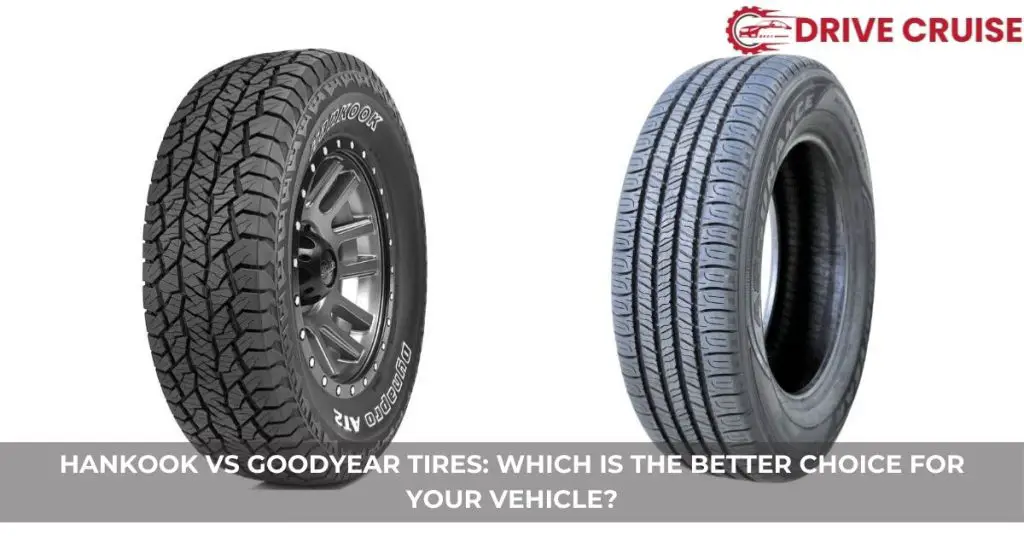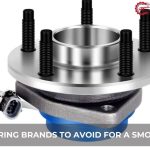When it comes to choosing the right tires for our vehicles, we all want to ensure we’re making the best decision. It’s not just about durability and performance; it’s also about safety and comfort on the road. That’s why the debate between Hankook and Goodyear tires is one we find ourselves in time and time again. Both brands have their loyalists and their skeptics, but what really sets them apart?
In this comparison, we’ll dive into the nitty-gritty of what makes Hankook and Goodyear tires stand out from the crowd. We’re looking at everything from tread life to price points, and how each brand performs under various driving conditions. It’s a battle of the titans, and we’re here to help you decide which tire is the champion for your vehicle. So, buckle up as we take a closer look at Hankook vs Goodyear tires.
Overview of Hankook Tires
In transitioning from the broader comparison, let’s dive deeper into Hankook tires, a brand that’s gained significant traction in the automotive market. Hankook Tire & Technology, established in 1941 in South Korea, has grown into a global leader known for its innovative tire designs and cutting-edge technology.
Hankook takes pride in offering a wide range of tires that cater to almost every type of vehicle, from passenger cars to trucks and buses. Their product lineup includes all-season, winter, and performance tires, ensuring drivers can find a match for their driving needs and weather conditions.
One of the standout aspects of Hankook tires is their commitment to innovation. They invest heavily in research and development, which has led to proprietary technologies such as the Kontrol Technology philosophy. This framework ensures their tires provide a perfect balance of performance, comfort, safety, and environmental friendliness.
Drivers often choose Hankook for their competitive pricing without compromising on quality. Their tires are known for offering excellent value, with durability and performance that can stand toe-to-toe with more expensive brands. Moreover, Hankook has a solid reputation for tread life, with many of their models featuring warranties that reassure consumers about the longevity of their tires.
Performance under various driving conditions is another highlight. Hankook tires are designed to deliver reliable handling and stability, whether navigating wet highways or curvy mountain roads. Their winter tires, in particular, receive high marks for traction and safety in snow and ice.
Hankook caters to a broad audience by providing a diverse selection of tires that meet different needs and budgets. Their emphasis on innovation and value makes them a compelling option for drivers looking for reliable and high-performing tires.
Overview of Goodyear Tires
Building on our discussion, after examining the qualities and strengths of Hankook tires, we now shift our focus to Goodyear tires. Established in 1898, Goodyear stands as one of the world’s most renowned tire manufacturers, boasting over a century of innovation and reliability in the automotive industry. Known for their cutting-edge technology and pioneering developments in tire design, Goodyear tires represent a hallmark of quality and performance.
One of the key attributes of Goodyear tires is their commitment to safety. The brand invests heavily in research and development, leading to breakthroughs such as their Weather Reactive Technology which adapts to environmental changes, providing superior grip and handling in various conditions. This innovation ensures drivers experience a safer, more stable ride, irrespective of weather or terrain.
Goodyear’s extensive lineup caters to a broad spectrum of vehicles, including passenger cars, trucks, SUVs, and even performance racing. Among their offerings, the Eagle series stands out for high-performance vehicles, delivering exceptional speed and handling, while their Assurance family focuses on safety and durability for everyday driving.
Sustainability is another cornerstone of Goodyear’s philosophy. They’ve introduced bio-based materials and tire designs aimed at reducing fuel consumption and emissions, demonstrating their dedication to eco-friendly practices. This approach not only benefits the environment but also enhances fuel efficiency for drivers.
Moreover, Goodyear’s global presence and strong network of dealers ensure that their tires are easily accessible to consumers worldwide, backed by comprehensive warranty policies that underscore their confidence in product quality and durability.
In comparing Goodyear with Hankook, it’s clear that both brands bring distinct strengths to the table. Goodyear’s rich heritage, coupled with their focus on innovation, safety, and sustainability, offers a compelling choice for drivers prioritizing these attributes.
Performance Comparison
Delving deeper into the performance comparison between Hankook and Goodyear tires, we find that each offers unique benefits tailored to different driving needs and conditions. Our analysis focuses on key areas such as handling, durability, and specific terrain performance, which are critical for drivers making an informed decision.
Firstly, handling is a paramount concern for most drivers. Hankook tires, known for their Kontrol Technology, provide impressive responsiveness on both dry and wet surfaces. They excel in quick maneuvers and provide a stable driving experience at high speeds. In contrast, Goodyear tires leverage their Weather Reactive Technology to offer unparalleled grip and handling in a range of conditions, from sunny days to heavy downpour situations. Their traction capabilities in severe weather conditions often stand out as a significant advantage.
When it comes to durability, Goodyear’s long-standing reputation comes into play. The brand is synonymous with tires that withstand various terrains and last longer under typical driving conditions. Goodyear tires are designed to meet the demands of everyday driving, as well as more challenging scenarios, without compromising on performance. Hankook, while also providing durable options, focuses on technology integration to enhance tire life. Their use of innovative rubber compounds and tread designs contribute to a slower wear rate, ensuring longevity and reliability.
Specific terrain performance underlines where each brand shines distinctly. Hankook offers a range of tires designed for high performance and sports cars, especially those that require rapid acceleration and high-speed cornering capabilities. On the other hand, Goodyear has a robust selection of all-season and winter tires, known for their superior performance in snow and icy conditions. Their specialized tread patterns and weather-specific technologies make them a go-to choice for drivers in colder climates, seeking safety and stability.
Choosing between Hankook and Goodyear tires boils down to individual driving needs and preferences. Whether prioritizing handling and speed, or durability and all-weather reliability, both Hankook and Goodyear offer compelling options that cater to diverse vehicles and driving conditions.
Price Range Analysis
Continuing our exploration of Hankook and Goodyear tires, let’s delve into the price range analysis of both brands, an essential factor for many consumers. Understandably, budget plays a significant role in the final decision-making process when selecting tires.
Hankook tires are generally known for offering an excellent balance between quality and affordability. Their prices often appeal to a wide range of consumers, especially those looking for reliable performance without breaking the bank. For instance, entry-level Hankook tires for passenger cars might start from around $90 per tire, offering a cost-effective solution for daily drivers.
On the other hand, Goodyear’s pricing reflects its long-standing reputation and innovation in tire technology. Goodyear tires tend to be priced slightly higher, attributed to their extensive R&D and superior material quality. The starting price for Goodyear’s standard passenger car tires can be around $100 per tire, with premium models, such as those designed for extreme weather conditions or sports performance, climbing significantly higher.
Moreover, Goodyear’s premier offerings, including specialized all-season and winter tires, could see prices exceeding $150 per tire, catering to enthusiasts and those with specific driving needs. These products often include advanced features such as Weather Reactive Technology, justifying their higher price point.
Both Hankook and Goodyear offer warranties and satisfaction guarantees, which can add value to their products despite the upfront cost. Hankook provides a competitive tread life warranty that assures customers of the durability of their purchase. Similarly, Goodyear offers a variety of warranty options, including tread life and road hazard protection, ensuring buyers feel confident in their investment.
While Hankook presents a more budget-friendly option with its competitive pricing and solid performance, Goodyear caters to a segment of the market willing to invest in higher-priced tires for advanced technology and greater assurances. The choice between affordability and technological innovation in tires ultimately depends on individual preferences and driving requirements.
Customer Reviews and Feedback
After exploring the differences in price and technology between Hankook and Goodyear tires, we move on to consider what customers are saying about these brands. Customer reviews and feedback are invaluable for understanding real-world experiences with tires from both manufacturers.
Hankook tire users often highlight their satisfaction with the tires’ longevity and price-to-performance ratio. Many point out that Hankook tires provide a quiet and comfortable ride, making long trips less tiring. In forums and review websites, customers share stories of Hankook tires holding up well under various driving conditions, praising them for their durability and handling. The budget-friendly nature of Hankook tires, combined with their performance, makes them a favored option among cost-conscious drivers who still prioritize quality.
On the other hand, Goodyear customers frequently commend the brand for its innovative features and reliability. Reviews often mention the enhanced safety and performance in both wet and dry conditions, attributed to Goodyear’s Weather Reactive Technology. The higher price point of Goodyear tires is generally seen as justified by their superior technology and material quality. Customers also appreciate the extensive warranty options offered by Goodyear, which provide an added layer of assurance. However, it’s worth noting that some reviews discuss a trade-off between the advanced technology and the tire’s overall lifespan.
Across various reviews for both brands, a common theme emerges: choosing between Hankook and Goodyear often boils down to individual preferences and priorities. Whether it’s Hankook’s balance of affordability and quality or Goodyear’s focus on technology and performance, reviews suggest that both brands have loyal customers satisfied with their choices. As always, we recommend reading through a variety of customer feedback and considering your own driving needs and budget before making a decision.
Conclusion
Deciding between Hankook and Goodyear tires boils down to what matters most to us. If we’re looking to stretch our dollars while still getting a reliable ride, Hankook seems like a smart pick. Their reputation for longevity and affordability makes them a go-to for budget-savvy folks. On the flip side, if we’re all about embracing the latest in tire technology and don’t mind paying a bit extra for top-notch performance and peace of mind in any weather, Goodyear’s offerings are hard to beat. Ultimately, whether we lean towards Hankook’s cost-effectiveness or Goodyear’s innovative edge, we’re making a choice that suits our unique needs and preferences. And that’s what counts.
Related Posts:
- Best Tires for Stretching: Top 10 Stretched Tire Options
- Hankook vs Goodyear Tires: Which is the Better Choice for Your Vehicle?
- Can You Mix 5W30 and 5W20? All You Need to Know!
- Michelin vs Continental: Which Tire Brand Reigns Supreme?
- Wheel Bearing Brands to Avoid for a Smoother Ride
- Yokohama vs Michelin Tires: Which One Should You Choose?













